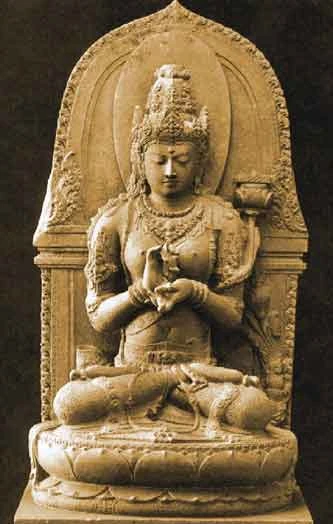I don't know why but I love books with historical settings - Indonesian history is no exception as long as the author is capable of captivating me with his/ her way of storytelling. I don't care whether it is detective, romance, or political novel, as long as it is interesting. And the characters from Hindu-Buddha period have such beautiful Sanskrit names. Mahendradatta, Airlangga, Tribhuwana Tunggadewi, Pramodhawardhani, Jayakatwang, Dandang Gendis...
Arok Dedes tells us about the coup d'etat of Tumapel - a fief of Hindu kingdom of Kediri/ Kadiri - which started the beginning of Kediri coup d'etat. The caste division in Toer's recreation of Kediri is, ordered from the lowest, pariah - sudra - ksatria - brahmin. The waisya caste was abolished by King Erlangga some 200 years before the events in the novel. King Erlangga, who worshiped Vishnu, did many things that caused discontent and angered the brahmins, who mostly worshiped Shiva and Parvati, his wife. The novel opened with a strong event. Tunggul Ametung, the akuwu (vassal) of Tumapel, kidnapped and force married and then raped Dedes, daughter of Mpu Parwa, a brahmin who worshiped Shiva. Tunggul Ametung was a sudra, the second lowest caste, whereas Dedes was a brahmin, the highest caste. The kidnapping of Dedes - a maiden with goddess-like features - was an event that triggered a multitude of events, which resulted on the fall of Tunggul Ametung and the installation of Arok as the rightful new ruler.
Toer recreated the 1220 AD Hindu-Buddha kingdom so well it is so believable. Conflicts based on religious reasons were as rampant as nowadays, as well as corrupt officials and oily politicians. Many compared the events in Arok Dedes with the real coup d'etat of Sukarno, the first president of Indonesia, dictator and Proclamator of Independence, but I honestly cannot see that much similarities. You can say that Arok is Suharto's equivalent, whereas the Indonesian Communist Party (PKI) can be equated with Kebo Ijo's/ Mpu Gandring's Movement. The sleight of hand, throwing all the blame on a not-so-innocent-but-much-stupider-side can be considered as a similarity. But equating Ametung with Sukarno is stretching a bit too far... The similarities of the Indonesian 1965 coup and the Tumapel 1220 coup stops here.
I cannot say I like the way Dedes depicted here. She is sometimes smart and brave enough to undertake vital tasks (tricking Kebo Ijo, drugging Ametung) but sometimes she is so naive I almost laugh in disbelief. One of the example of her naivete is believing that Arok-Lohgawe's conspiration was truly to replace Vishnu with Shiva as the main god to worship. Which of course, was never their intention from the very beginning.
Her beauty saved her ass so many times it's hard to count. Ametung was smitten, Kebo Ijo was willing to sacrifice Tumapel as long as he can have Dedes, and Arok fell in love as well. Even Helen of Troy doesn't have that many admirers. And the next kings of Javanese kingdoms can trace their lineage back to Dedes. The kings of Singasari (the new kingdom Arok erected after vanquished Kediri) were Dedes-Ametung descendants, while the kings of Majapahit were Dedes-Arok's. The Greeks have a woman with face that can launch a thousand ships; we have a woman whose descendants built two different kingdoms.
 |
| She is truly a lucky woman. |
Toer is proven an admirable author, for he composed a story so rich in details and captivating in mere three months (1st October - 24 December 1976) during his exile in Buru. He combined the words beautifully, made them convey the meaning and nuances gorgeously and unerringly. Few authors can combine proper, beautiful Indonesian words without making the result feels cheap, fake, and too sappy (cough, Andrei Aksana, cough). So far, the most skilful wordsmiths I have encountered beside Toer are Remy Sylado (I REALLY WANT a copy of Ca Bau Kan, by the way) and Sapardi Djoko Damono. Arok Dedes is definitely a must read and must have because reading it once is not enough. This is my second reading, my first was five years ago.
And folks, the closing is awesome for Indonesian novel. Pretty hardcore.
Arok Dedes is a novel that proves that you can read a novel with good quality with enjoyment and no boredom.
And folks, the closing is awesome for Indonesian novel. Pretty hardcore.
 | ||
| Hint, hint. |

No comments:
Post a Comment